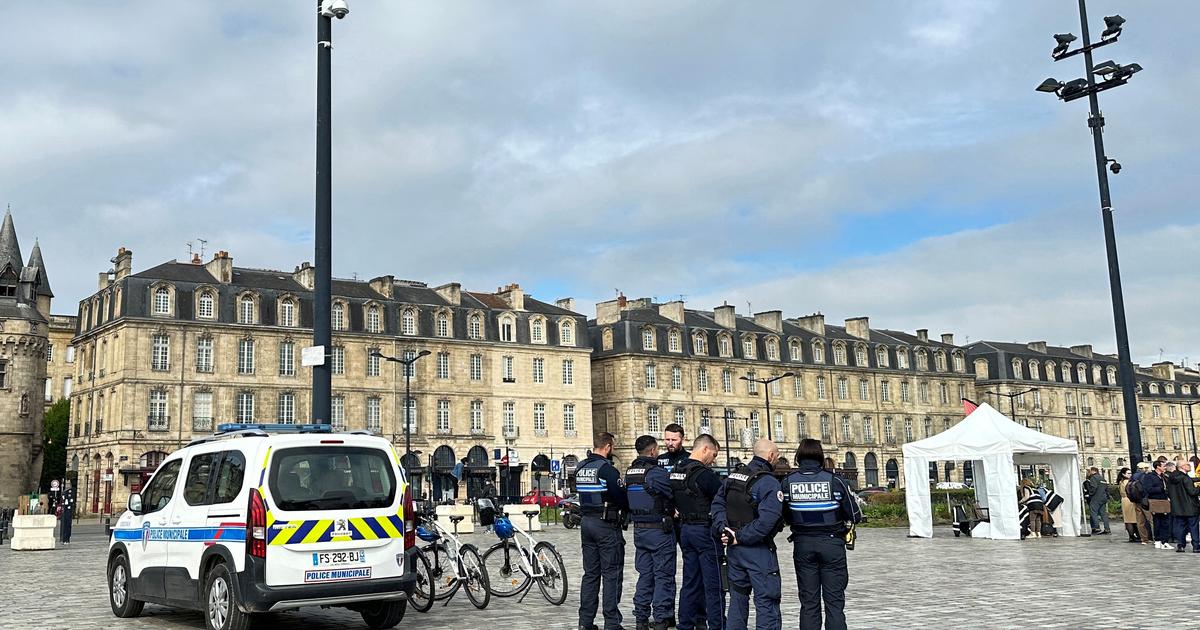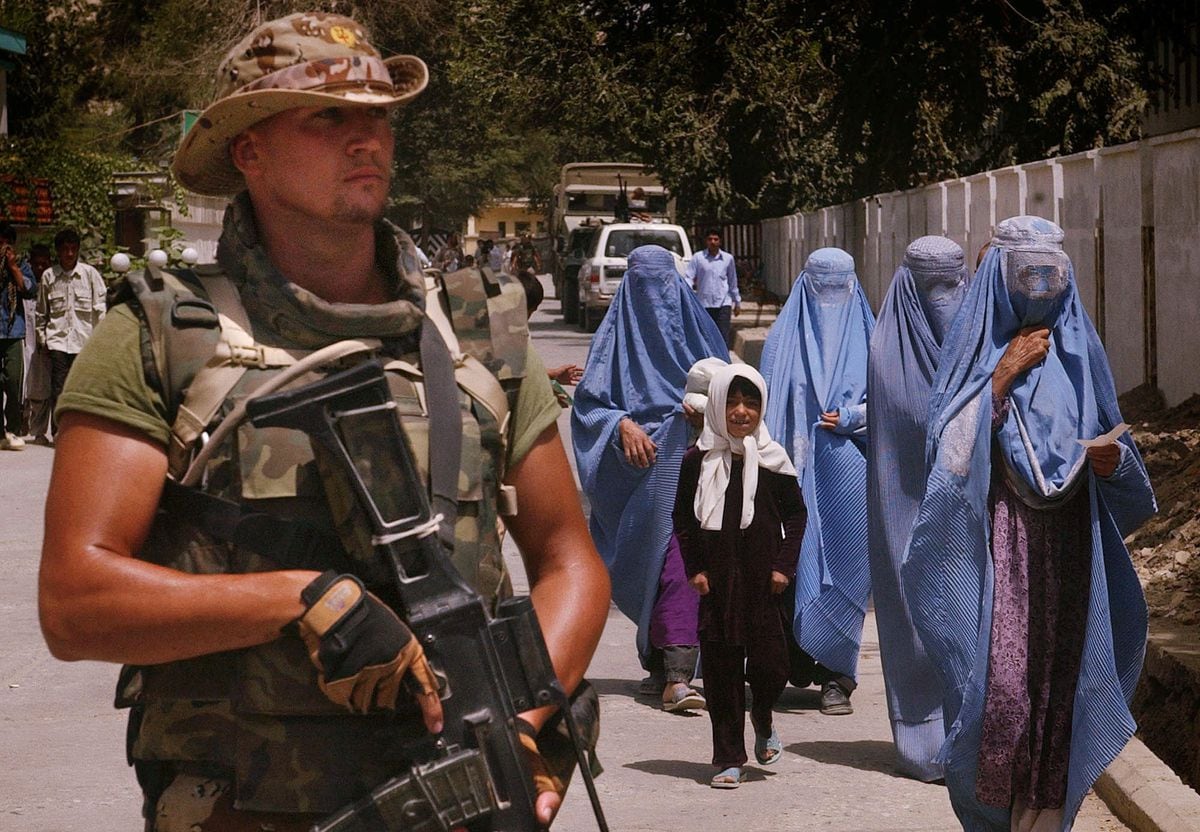Enlarge image
A military plane leaves the airport in Kabul - while stranded Afghans have to stay behind.
Photo: Marcus Yam / Los Angeles Times / Getty Images
Aref Saboor knows that this one moment counts.
He has waited here again for 17 hours.
All in vain.
It's now or never.
Saboor stands on tiptoe in the crowd, jumps, shouts and stretches his shield into the sky.
An A4 piece of paper with the label "BMC Bundeswehr Local Employee".
"Suddenly one of the soldiers looked over," remembers the Afghan journalist a day and a half later in a telephone conversation from Kabul with the reporter in Germany, "first he looked at my sign and then into my eyes." , then tells Saboor to jump into the ditch. A few moments later, the journalist catches up with his colleagues, on the safe shore.
Aref Saboor worked for the Germans at the Bayan Media Center in Mazar-i-Sharif until the end of May.
At the end of June, the 32-year-old fled to the capital with his wife Zarina and their one-year-old daughter Nirvana.
Here they hid from the Taliban.
Saboor is on an Islamist death list.
But because he was not directly employed by the Germans, but by a contractor, the original intention was not to evacuate him.
After several German media reported about his fate, he was called after all.
The three of them should try their hand at the airport, he was told.
"We were at one of the gates six times, sometimes over twelve hours, and entry was completely impossible," says Saboor.
They don't make it until late Tuesday morning at the Baron Gate.
The rush of the masses is at least channeled at this point: A ditch full of stinking water runs between the selectors and the chosen ones.
At this point Aref Saboor catches the soldier's gaze.
On the evening of the same day, an Airbus A400M of the Air Force with the family on board soars into the sky.
He said he hadn't had any time to think about the fact that they were probably leaving their homeland forever: "I was completely moved by the feeling that my life was no longer in danger."
By Tuesday evening, the Germans had flown out 4,650 people.
The US President had confirmed that all US soldiers would be withdrawn from Kabul by the end of the month.
The Taliban called August 31 the "red line."
The Germans who are dependent on the US Army will have to end their mission much earlier.
According to SPIEGEL information, the Bundeswehr's last A400M machine will take off from Kabul on Thursday.
The evacuations are completely chaotic
Until then, the crucial bottleneck in getting people out will be access to the airport grounds.
Even after ten days, the Federal Foreign Office and the Bundeswehr did not manage to implement a functioning evacuation concept.
Their information behavior is also ruinous.
The multiple system failures are likely to have fatal consequences.
People in need of protection report in an increasingly aghast tone that they either received no instructions at all, or that they received incomplete or confused instructions. Until recently, Salam Ramini * ran an Afghan state-owned company. He is 64 years old and seriously ill. First he had been instructed to try the overcrowded gates on his own. The German citizen finally got a call from diplomats early on Monday evening. "They said I should get ready, I would be contacted again in an hour," he said on the phone from his hiding place in Kabul.
Contrary to what had been agreed, he was not even called the next day. On Wednesday, after hours of unsuccessful attempts, the German-Afghan finally got a former embassy employee on the phone. "I was supposed to come to the Baron Gate, but it was utter chaos," says Ramini. When he drove to the Norddtor, he was instructed by text message to drive home immediately: "Because there are allegedly terrorists of the Islamic State on the way."
Patouni Izaaqzai-Teichmann from the Afghan German Association is on the phone from morning to night these days with people who feel they have been left in the lurch because they are either ignored or the Germans ignore their loved ones. “We have long since made an offer to the government,” says Izaaqzai-Teichmann, “we could organize collection points and transports on site ourselves. Only the transfer to the site would have to be guaranteed by the Federal Foreign Office or the armed forces. "Because you wouldn't let them, people would probably have to die, she says:" I go crazy when I think about it. "
Apparently, the lack of transparency is also meeting with growing criticism in the troops. A lieutenant colonel in the Oberführungskommando, who wants to remain anonymous, complains by telephone: »I hear from members of the Afghan army who are being evacuated while local workers who deserve the Bundeswehr are left behind. That's not okay. Are there no rules at all here? "
Bundeswehr helpers or companies subordinate to GIZ or the Federal Foreign Office who will remain in Kabul from September 1st, will depend on the mercy of the Taliban.
The Islamists are showing a friendly face to the international press these days and have announced a general amnesty.
But that does not coincide with UN reports of serious human rights violations.
Nor does it fit with increasingly violent fighters on Kabul's streets.
The Taliban's mercy is in doubt
On Wednesday, the Taliban repeatedly prevented Afghans from getting through to the airport. Videos show a bearded man kicking an unarmed civilian with a laugh and, like another, killing a member of the mostly Shiite Hazara minority with the butt of a rifle. "They also beat with sticks and whips," says a Bundeswehr linguist who stayed in Kabul. This man has observed astonishing scenes in front of a well-known hotel in the center of Kabul, which indicate a tacit arrangement with the Islamists.
"Minibuses are parked on the other side of the street," explains the translator.
Taliban fighters are posted directly in front of the gate.
There is a crowd in front of it.
Every few hours, the eyewitness says, someone comes out of the hotel door to fish people out of the crowd, who are then led onto the hotel grounds.
"Later they will be led in groups to the buses," says the translator: "With a Taliban guard."
* Name changed by the editor



/cloudfront-eu-central-1.images.arcpublishing.com/prisa/KA3LQ5ZEAFEQXOIZXJEEVDUZUQ.jpg)





